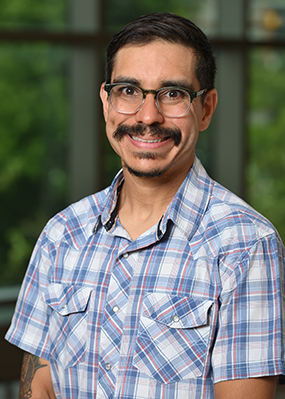APS honors Caballero, team for supersizing physics teaching with computing
Physics education researcher Danny Caballero is being honored by the American Physical Society (APS) for building the village needed to provide physics students with crucial computing skills.

Danny Caballero, Lappan-Phillips Associate Professor of physics education. Credit: Harley J. Seeley
Caballero is part of the Partnership for Integrating Computation into Undergraduate Physics (PICUP) Team receiving the APS Excellence in Education Award. Caballero, an associate professor, has with the team rallied hundreds of physics educators focused on helping students develop valuable computational skills, and given those educators the support and resources to make meaningful changes in curriculum.
"It is great that Professor Caballero and the whole PICUP team have been recognized with the APS Excellence in Physics Education Award,” said Stephen Zepf, MSU Department of Physics and Astronomy chair. “They have worked for many years to develop and share resources for educators to use computation to enhance physics teaching, and the award is highly deserved."
Computational sciences have seen rapid development in recent years, creating new horizons of discovery and employment. But changing undergraduate curriculums throughout academia is in a slower lane. The PICUP team “has established a site and a process for the peer-review and dissemination of high-quality instructional materials to achieve the goal of lowering the barriers to integrating computation into physics curricula,” wrote Ernest Behringer, Eastern Michigan physicist and interim department head in his nomination letter.
Caballero said even the most passionate physics teachers can be overwhelmed by time and organizational challenges of changing established curriculums. Founded 15 years ago, PICUP has built a community with space populated by more than 90 workshops, meetings and webinars since 2016.
Several hundred physics educators across the country communicate through a dedicated Slack team to brainstorm, get advice and support. PICUP maintains an online portal through which materials are developed and peer-reviewed, stored, and freely disseminated to verified educators.
“Our students will be entering an interdisciplinary workplace, so we need to challenge ourselves about what it takes to have an interdisciplinary education,” said Caballero, a Lappan-Phillips Associate Professor of physics education. “PICUP is uniquely positioned to help people move toward that.”
He added the next frontier is high school science education.
Caballero shares the award, which includes a $5,000 stipend, with fellow PICUP team leaders Kelly Roos of Bradley University, Larry Engelhardt of Francis Marion University, Marie Lopez del Puerto of University of St. Thomas, Norman Chonacky of Yale University and Robert Hilborn of the American Association of Physics Teachers.
The awards ceremony will be at the society’s April 2023 meeting in Minneapolis. Their work has been supported by three National Science Foundation grants totaling $1.5 million.
Banner image: Computational sciences have seen rapid development in recent years, creating new horizons of discovery and employment. But changing undergraduate curriculums throughout academia is in a slower lane. The Partnership for Integrating Computation into Undergraduate Physics (PICUP) Team has established a site and a process for the peer-review and dissemination of high-quality instructional materials to achieve the goal of lowering the barriers to integrating computation into physics curricula. Credit: Shutterstock/vs148